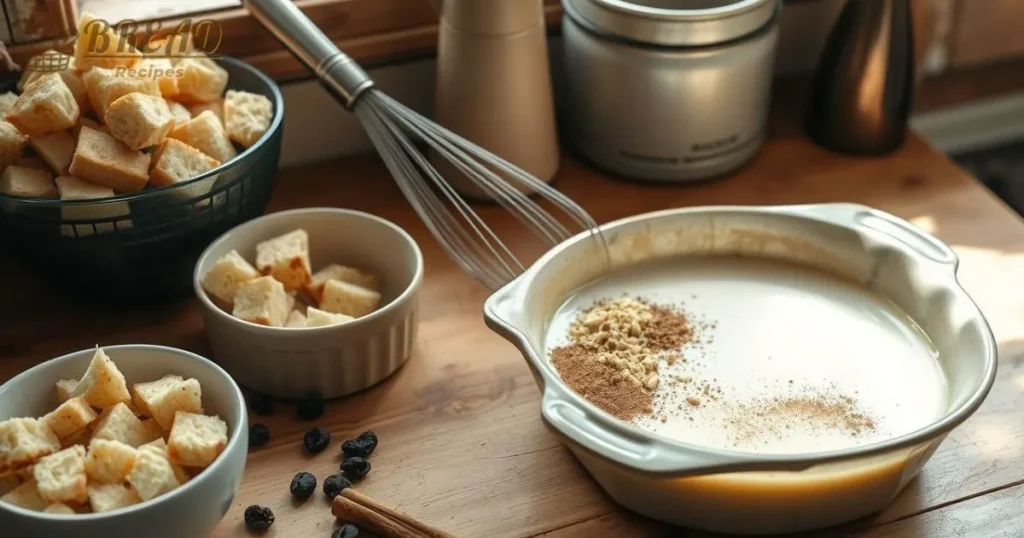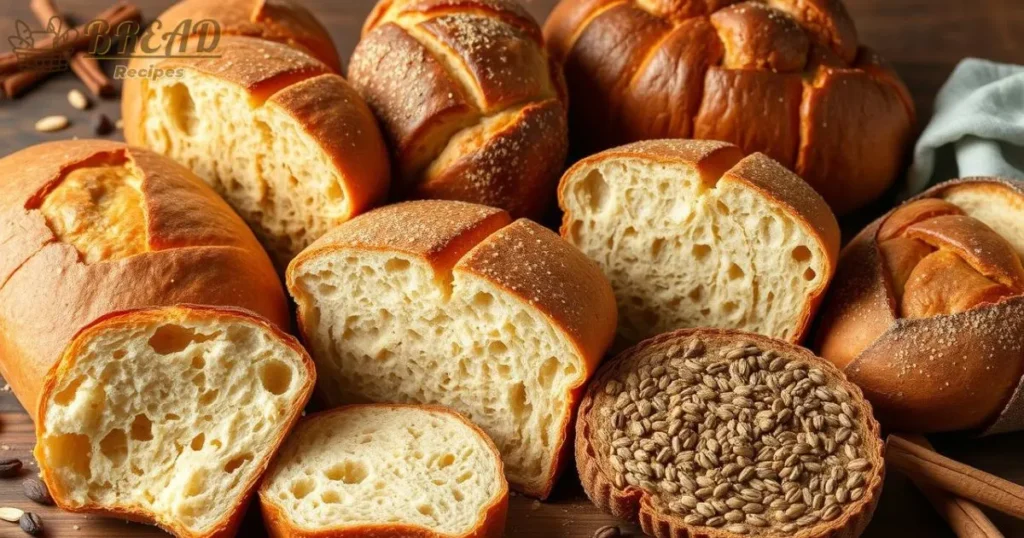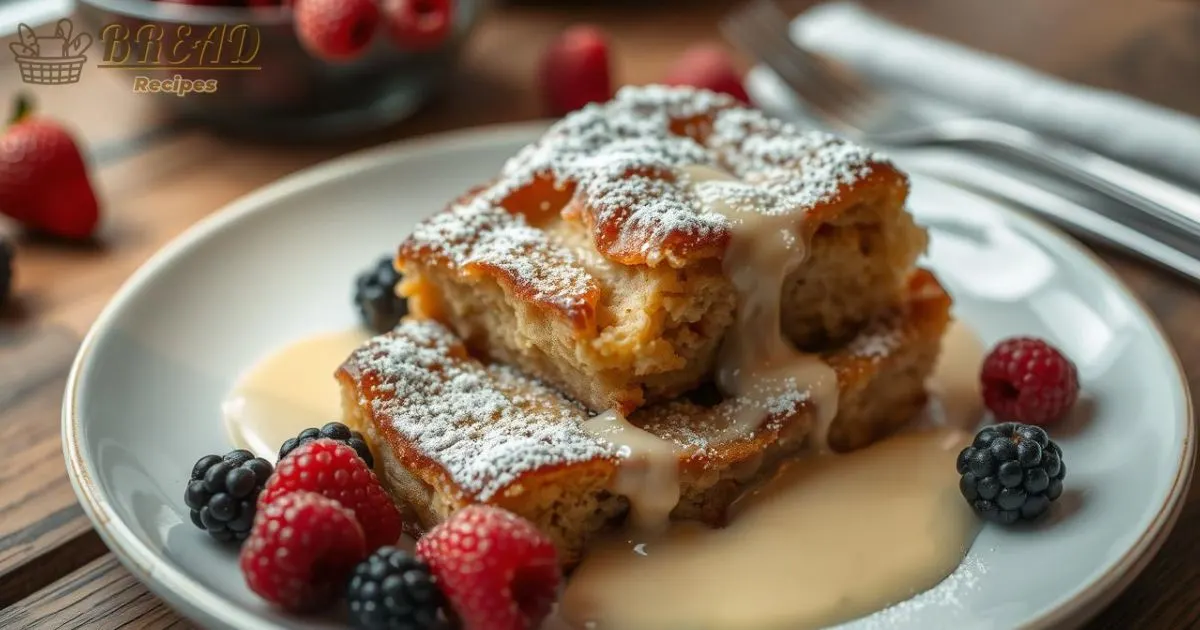Table of Contents
Ever wondered how to turn stale bread into a delicious dessert? Dense bread might be the secret you never knew you needed for your bread pudding recipe!
In the world of bread pudding, not all breads are the same. Bakers and home cooks have found that dense bread makes a simple dessert into a masterpiece. This quick guide will show you how to use dense bread for your best bread pudding recipe.
Stale bread has many uses, but bread pudding is a tasty way to avoid wasting it. Whether you have leftover brioche, challah, or sourdough, these dense breads can make an ordinary dessert into something special.
Key Takeaways
- Dense bread provides superior texture and flavor for bread pudding
- Stale or day-old bread works best for creating rich desserts
- Different bread types can dramatically change pudding characteristics
- Bread pudding is an excellent way to reduce food waste
- Proper preparation is key to achieving the perfect pudding consistency
Understanding Bread Pudding Basics
Bread pudding is a timeless dessert that turns simple ingredients into a delightful treat. It has its roots in medieval European kitchens. There, cooks used stale bread to avoid waste.

What is Bread Pudding?
A bread pudding recipe turns leftover bread into a rich, custardy dessert. It mixes bread cubes with eggs, milk, sugar, and spices. Then, it bakes until it’s golden and fragrant.
Key Ingredients in Bread Pudding
- Dense bread cubes (5-6 cups)
- Eggs (4 large)
- Whole milk (2 cups)
- Sugar (1/2 cup)
- Vanilla extract (1 tablespoon)
- Melted butter (2 tablespoons)
Why Bread Type Matters
The right bread is key to a great bread pudding. Breads like brioche or challah soak up custard well. They keep their texture, making the dessert luscious.
“Bread pudding is not just a recipe, it’s a delicious solution to preventing food waste.” – Culinary Historian
| Bread Type | Absorption Quality | Flavor Profile |
|---|---|---|
| Brioche | Excellent | Rich, buttery |
| Challah | Very Good | Slightly sweet |
| Sourdough | Good | Tangy, complex |
Characteristics of Dense Bread
Choosing the right bread is key when making bread pudding. Dense bread brings unique benefits that can turn stale bread into a tasty treat.

Dense bread is great for bread pudding because it holds up well. It absorbs custard without falling apart. The right dense bread can make your dessert truly special.
Types of Dense Bread for Pudding
- Brioche: Rich, buttery texture perfect for pudding
- Challah: Slightly sweet with excellent absorption
- Sourdough: Adds complex flavor profile
- French country bread: Robust and hearty
Texture and Flavor Considerations
Different dense breads have different effects on pudding. Brioche, for example, is the best for bread and butter pudding. It provides a solid base that prevents it from getting too soggy.
“The method of bread cutting significantly impacts the texture and overall experience of bread pudding.” – Culinary Research
| Bread Type | Texture | Flavor Profile | Absorption Rate |
|---|---|---|---|
| Brioche | Soft, rich | Buttery, sweet | Moderate |
| Challah | Dense, springy | Slightly sweet | High |
| Sourdough | Firm, chewy | Tangy, complex | Low to moderate |
For the best pudding, pick dense bread that’s a day or two old. These breads soak up custard better, making your dessert richer and more flavorful.
can you use dense bread for bread pudding
Benefits of Using Dense Bread for Pudding
Choosing the right dense bread can make your bread pudding amazing. Dense breads add special qualities that make your dessert stand out.
Enhanced Flavor and Texture
Dense bread adds depth to your bread pudding. Breads like brioche and challah make it more substantial. They soak up custard well, so the pudding stays firm.
- Richer flavor profile
- More consistent texture
- Better custard absorption
Improved Moisture Retention
Keeping the pudding moist is key. Dense breads do this well, keeping your dessert soft and tasty. They have just the right moisture level for soaking up custard.
“The secret to a perfect bread pudding is selecting the right dense bread that can hold its structure while soaking up all the delicious custard.” – Pastry Chef
| Bread Type | Moisture Absorption | Flavor Intensity |
|---|---|---|
| Brioche | Excellent | Rich |
| Challah | Very Good | Slightly Sweet |
| French Bread | Good | Neutral |
By picking the right dense bread, you’ll make a pudding that’s moist, flavorful, and irresistible.
How to Prepare Dense Bread for Pudding
Turning stale bread into a tasty dessert is an art. Bread pudding fans know that getting it right starts with the bread. Choosing and preparing the right bread is the secret.
The bread you pick is crucial for a great bread pudding. Dense breads are best because they add a rich texture and flavor. They soak up custard beautifully.
Day-Old vs. Fresh Dense Bread
The best bread for pudding is usually day-old or a bit stale. It has many benefits:
- Better custard absorption
- Enhanced texture
- Less sogginess
- More intense flavor
Cutting and Soaking Techniques
Getting your bread ready is important. Here are some tips:
- Cut bread into uniform 1.5-2 inch cubes
- Arrange cubes evenly in baking dish
- Pour custard mixture over bread
- Gently press bread to ensure complete coverage
- Let bread soak for 15 minutes before baking
Pro tip: If using fresh bread, lightly toast it in the oven to simulate the drier texture ideal for bread pudding.
Pro bakers recommend brioche for its rich taste and perfect absorption properties. With these tips, you’ll make a bread pudding that will wow everyone!
Common Dense Breads for Bread Pudding
Choosing the right dense bread can make your bread pudding recipe stand out. Each bread type adds its own flavor and texture, making the dessert even better.
Brioche: A Buttery Delight
Brioche is a top pick for bread pudding. Its buttery taste makes it rich and luxurious. It’s also very moist, thanks to its high egg and butter content.
- Exceptionally rich flavor
- Soft, tender crumb
- Ideal for sweet bread pudding recipes
Challah: Sweet and Traditional
Challah adds a sweet touch to your bread pudding. This Jewish bread is known for its dense structure and slightly sweet taste. It soaks up custard perfectly.
*Challah transforms ordinary bread pudding into a truly special dessert*
Sourdough: A Tangy Twist
Sourdough brings a unique twist to bread pudding. Its tangy flavor contrasts beautifully with the sweet custard. This makes the dessert more interesting.
| Bread Type | Flavor Profile | Texture |
|---|---|---|
| Brioche | Rich, Buttery | Very Soft |
| Challah | Sweet, Subtle | Dense, Tender |
| Sourdough | Tangy, Complex | Firm, Substantial |
When picking dense bread for your pudding, think about the flavor and texture. Try different breads to find your favorite mix!
Adjusting Recipes for Dense Bread
Making the perfect bread pudding with dense bread needs careful thought. Dense bread has special traits that require certain tweaks. These tweaks are key to creating a dessert that’s both tasty and textured right.
Liquid Ratio Modifications
Dense bread soaks up liquid in a way that lighter breads don’t. When making your bread pudding, you’ll need to tweak a few things:
- Increase liquid content by 25-30%
- Use whole milk or cream for richer consistency
- Allow bread to soak longer before baking
Sugar Adjustments for Optimal Sweetness
The amount of sugar in your bread pudding depends on the dense bread type. Sweet breads like brioche need less sugar. But, if you’re using a more neutral dense bread, you might need to add more sugar.
“The secret to a perfect bread pudding lies in understanding your ingredients’ intrinsic characteristics.”
Precise Ingredient Balancing
For a standard 9-inch pan with dense bread, follow these tips:
- Use 2.5 cups of milk
- Incorporate 5 large eggs
- Adjust sugar between 1/2 to 3/4 cup
- Add vanilla extract for depth of flavor
Try different ratios to find the perfect balance for your dense bread pudding recipe.
Baking Tips for Bread Pudding
Making the perfect breakfast bread pudding needs careful baking techniques. The right approach to temperature and moisture can make your recipe stand out.
Optimal Baking Temperature
Consistency is key when baking your bread pudding. Preheat your oven to 350 degrees Fahrenheit (175°C). This temperature helps your dense bread turn into a delicious breakfast treat without burning.
- Bake for 55-70 minutes
- Check for golden brown top
- Ensure firm but slightly jiggly center
Moisture Protection Techniques
Keeping moisture in during baking is vital for a moist bread pudding. Professional bakers suggest two key methods:
- Foil Covering: If the top browns too quickly, cover with aluminum foil
- Water Bath Method: Place your baking dish in a larger pan filled with hot water
“The secret to a perfect bread pudding is balancing temperature and moisture” – Pastry Chef Excellence
By using these baking tips, you’ll make a breakfast bread pudding that’s moist, tasty, and will wow everyone.
Serving Suggestions for Bread Pudding
Make your bread desserts stand out with creative serving ideas. These can turn a simple breakfast bread pudding into a showstopper. The right way to present it can impress everyone at the table.
Ideal Pairings and Toppings
Here are some tasty toppings to add to your bread pudding:
- Warm vanilla sauce
- Fresh whipped cream
- Powdered sugar dusting
- Vanilla ice cream scoop
- Caramel sauce drizzle
Presentation Ideas
Presenting your bread pudding can be fancy or casual. Use individual ramekins for a fancy look. Or, go for a big family-style dish for a cozy feel.
| Serving Style | Best For | Garnish Suggestions |
|---|---|---|
| Ramekin Servings | Dinner Parties | Mint leaves, berries |
| Large Baking Dish | Family Meals | Cinnamon sprinkle, nuts |
Pro tip: Serve your bread pudding warm for the most satisfying culinary experience.
Enjoy your bread pudding as a special breakfast or dessert. These serving tips will make your bread desserts even more delicious.
Troubleshooting Common Issues
When making a dense bread pudding, you might face some problems. These can change the texture and taste of your dessert. Knowing how to fix these issues will help you make a tasty treat every time.
Solving Moisture Problems
If your bread pudding is too dry, it might be because it was baked too long or didn’t have enough liquid. For a denser pudding, add a bit more milk or cream before serving. Or, make a simple sauce like vanilla custard or caramel to drizzle over it. This will add moisture and flavor.
Balancing Flavor and Texture
Choosing the right dense bread is key for your pudding. Different breads soak up liquid in different ways, affecting the texture. Try using challah or brioche to find the best balance. If the pudding tastes flat, add spices like cinnamon, nutmeg, or vanilla to boost the flavor.
Perfecting Your Technique
Creating bread pudding takes practice. Each dense bread type reacts differently, so don’t get discouraged if it’s not perfect at first. Adjust the liquid amounts, try different breads, and you’ll soon get the hang of it. Your bread pudding will impress everyone.
FAQ
Can I use fresh bread for bread pudding?
What are the best types of dense bread for bread pudding?
How do I prevent my bread pudding from becoming too mushy?
Can I make bread pudding with gluten-free bread?
What toppings work best with bread pudding?
How long should I bake bread pudding?
How can I store leftover bread pudding?
Can I add mix-ins to my bread pudding?
Source Links
- Best Easy Vanilla Bread Pudding – BAKE WITH ZOHA – https://bakewithzoha.com/easy-vanilla-bread-pudding/
- What Is Bread Pudding — And What Kind of Bread Should You Use? – https://www.allrecipes.com/article/what-is-bread-pudding/
- Traditional Bread Pudding Recipe – https://www.aglugofoil.com/2016/03/old-fashioned-bread-pudding-recipe.html
- Rustic Bread Pudding Recipe – https://www.onsuttonplace.com/rustic-bread-pudding-recipe/
- Kitchen Project #90: Bread & Butter Pudding – https://kitchenprojects.substack.com/p/kitchen-project-90-bread-and-butter
- The Biggest Mistake To Avoid When Baking A Classic Bread Pudding – Mashed – https://www.mashed.com/1520384/bake-bread-pudding-mistake/
- This Bourbon-Sauced Bread Pudding Will Transport You to New Orleans – https://www.simplyrecipes.com/recipes/bread_pudding/
- Best Dense Bread for Bread Pudding: Baker’s Guide – – https://artofcook.com/best-dense-bread-for-bread-pudding/
- Bing’s Easy Bread Pudding – https://flavor-feed.com/bings-easy-bread-pudding/
- 12 Bread Pudding Mistakes You Might Be Making – The Daily Meal – https://www.thedailymeal.com/1244131/bread-pudding-mistakes-you-might-be-making/
- Problem sweet bread – make bread pudding – https://cookingatclarktowers.com/2014/09/21/problem-sweet-bread-make-bread-pudding/
- Bread Pudding – https://iambaker.net/bread-pudding/
- The BEST Bread Pudding Recipe – Old Fashioned Recipe (With Video!) – https://fantabulosity.com/last-minute-bread-pudding/
- Bread and Butter Pudding – https://www.recipetineats.com/bread-and-butter-pudding/
- Grandma’s Bread Pudding Recipe – Live Well Bake Often – https://www.livewellbakeoften.com/grandmas-bread-pudding/
- The Best Sourdough Bread Pudding Recipe – https://www.pantrymama.com/sourdough-bread-pudding-recipe/
- Old Fashioned Bread Pudding – https://fiveandspice.wordpress.com/2010/10/18/old-fashioned-bread-pudding/
- Savory Bread Puddings | Cheese Connoisseur Magazine – https://www.cheeseconnoisseur.com/savory-bread-puddings-make-comforting-sense/
- Easy Bread Pudding With Vanilla Sauce – Pastry Wishes – https://www.pastrywishes.com/bread-pudding-with-vanilla-sauce/
- Use these bread pudding do’s and don’ts to avoid serving your guests goop – https://thegrio.com/2023/09/25/bread-pudding-recipe/
- Amazing, Easy Bread Pudding – Pretty. Simple. Sweet. – https://prettysimplesweet.com/creme-brulee-bread-pudding/
- Why is My Bread so Dense? (Bread Machine Section Included) – https://saladinajar.com/bread-machine/dense-bread/
- Baking Troubleshoot Guide | The Domestic Rebel – https://thedomesticrebel.com/2020/05/20/baking-troubleshoot-guide/
- Savory Bread Pudding Recipe – Artisan Bread in Five Minutes a Day – https://artisanbreadinfive.com/2014/01/15/savory-bread-pudding-how-to-use-up-leftover-bread/

